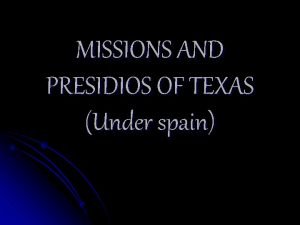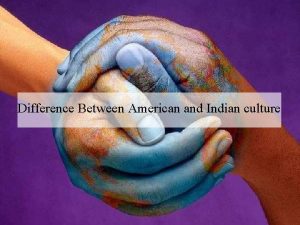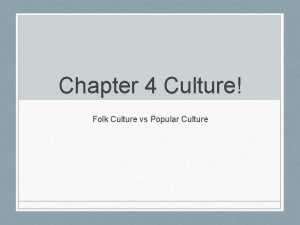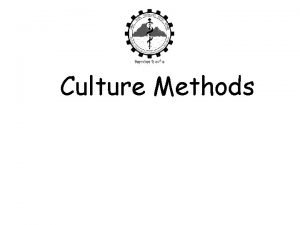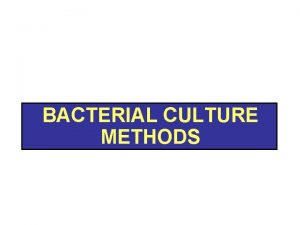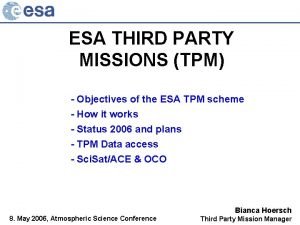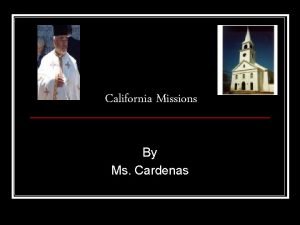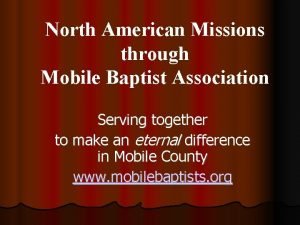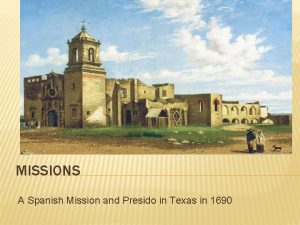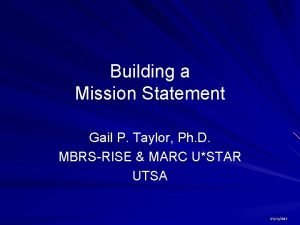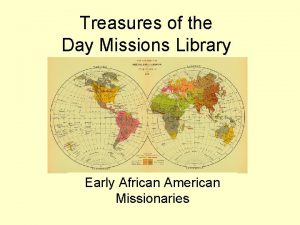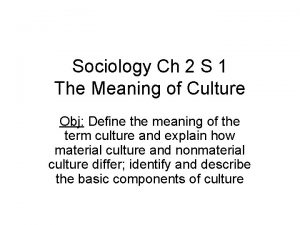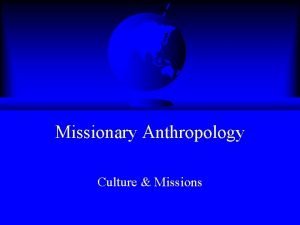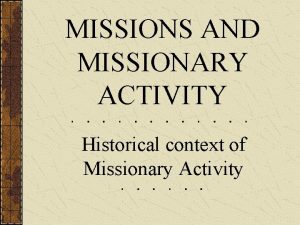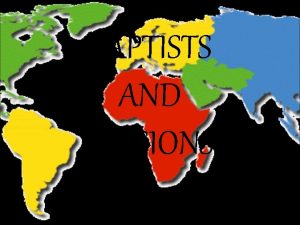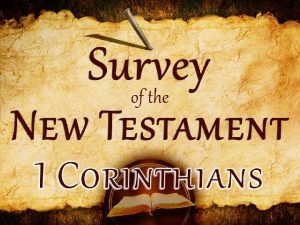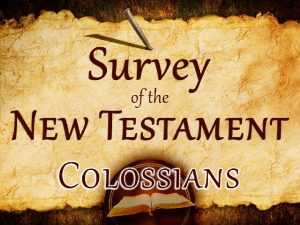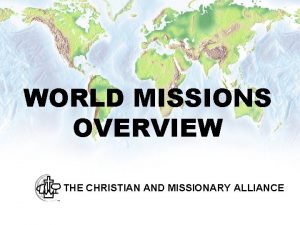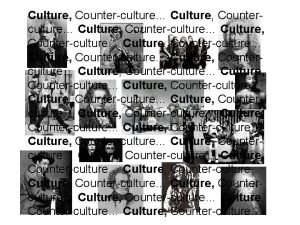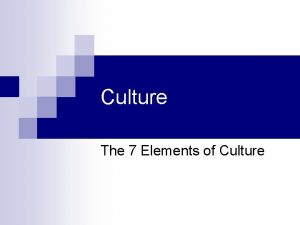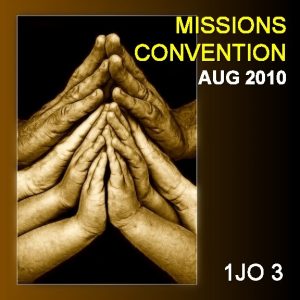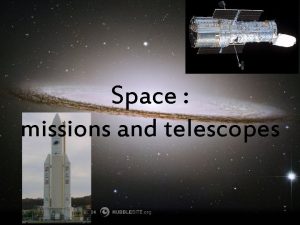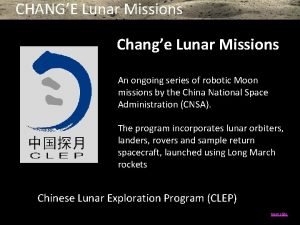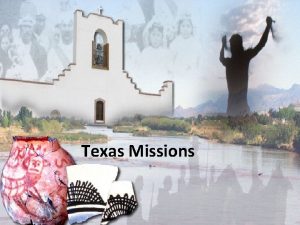MISSIONARY ANTHROPOLGY Introduction Missions and Culture Introduction Missionary






























- Slides: 30

MISSIONARY ANTHROPOLGY Introduction: Missions and Culture

Introduction Missionary Anthropology What is attractive? What do you find appealing? What kind of lips?

Introduction Missionary Anthropology OR

Introduction Missionary & Anthropology Ø What is considered beautiful is cultural (affective) Ø “’Culture’ came to mean not merely the aggregates of human thought and behavior, but both the systems of beliefs that lie behind ideas and actions and the symbols by which those ideas and actions are expressed. Cultures are seen as integrated wholes in which the many parts work together to meet the basic needs of their members” Hiebert 1985, Insights, 21).

Introduction Missionary & Anthropology • What is the relationship between God and culture? Or • What is the relationship between Christian missions and culture?

Introduction Missionary & Anthropology God and Culture • Four Perspectives of God and Culture • • God Against Culture God In Culture God Above but Through Culture

Introduction Missionary & Anthropology God and Culture • God Against Culture – holds that God is opposed to culture • Christians withdraw, reject, escape, isolate, or insulate themselves from the world • Problems with this view • (1 Jn. 2: 15 -16; 5: 19) kosmos – evil use of culture • Assumes because Satan uses culture evilly that all culture is evil • Culture is not just external but in us

Introduction Missionary & Anthropology God and Culture • God In Culture • Views God as created by humanity for something above themselves • God is seen as supporting ones own culture • Problems with this view • Makes humanity the source of God whether intentionally or for psychological reasons • Makes God a tool to support ones own ethnic identity (Acts 10, 15 - Jews and Gentles debate)

Introduction Missionary & Anthropology God and Culture • God Above Culture • Deism • Distant God and not involved • Dualist – Humanity very depraved so present world will be replaced • Conversionist – see humanity and culture having pervasive sin but God able to lift people up

Introduction Missionary & Anthropology God and Culture • God Above but Through Culture • This view understands God as above culture but using culture as a vehicle for interaction with human beings. • Culture can have both good and bad to varying degrees • God works as well as his followers within cultures for His desires and goals

Introduction Missionary & Anthropology though I am free from all men, I have made myself a slave to all, so that I may win more. 20 To the Jews I became as a Jew, so that I might win Jews; to those who are under the Law, as under the Law though not being myself under the Law, so that I might win those who are under 1 the Law; 21 to those who are without law, as without law, though not being without the law of God but under the law of Christ, so that I might win those who are without law. 22 To the weak I became weak, that I might win the weak; I have become all things to all men, so that I may by all means save some. 23 I do all things for the sake of the gospel, so that I may become a fellow partaker of it. 19 For 1 Corinthians 9: 19 -23 (NASB 95)

Introduction Missionary & Anthropology Bluetooth has arrived

Introduction Missionary & Anthropology § Bible Recognizes the Place of Culture: § Acts 14: 1 -18 – Paul & Barnabas encounter culture § Religions effect thinking § Worldview – “fundamental way of looking at things” (Hiebert 1985, 21) § Beliefs Illustration: Christmas pageant in India (Hiebert 1985, 13) § Acts 17: 16 -34 – All humanity belongs to God § Philosophy effects thinking § Acts 19: 11 -20 – Ephesus and the occult

Introduction Missionary & Anthropology § Bible Recognizes the Place of Culture: § § § § Saul and medium of En-dor (1 Sam. 28: 7) Joseph and Egyptian culture Nose ring (Gen. 24: 47) Men and earrings (Gen. 35: 4; Ex. 32: 2; 35: 22) At the gates (Ruth 4: 1 ff; Josh 20: 1 ff) Sandal given (Ruth 4: 7 ff) Covenants (used in ancient Near East)

Introduction Missionary & Anthropology Culture and Corruption in the Bible • • Noah and judgment Gen. 15: 16 sin of the Amorites Deut. 7: 1 -6 – destroy other gods Gods and goddesses (Gen. 31: 30) Jacob and wife’s idol

Introduction Missionary & Anthropology God, Humanity and Culture • • Humanity – created in God’s image Humanity creates cultures and societies God interacts and communicate with humanity Personal and involved For the benefit of humanity Physical wellbeing (garden, after fall clothes) Spiritual wellbeing (direction for life) Eternality

Introduction Missionary & Anthropology God of relationship within cultures • God Corrects and Improves • Mankind, his creation, always concerned for them. • Noah: the first missionary (Heb. 11: 7; 2 Pet. 2: 5) • God: The Provider • Covenant – a common means of making agreements with each other • Abraham: Called and promised to become great nation • Gen. 18: 18 through him all nations will be blessed. • Watch over His chosen people • Began fulfilling His promise

Introduction Missionary & Anthropology The Deliverer and Culture Perfecter • Moses: Commissioned by God (Ex. 3: 10) • Moses' four objections (Missions, pp. 5 -6) am I that I should go" - emphasis on his own abilities • People won't know who God is • What if they don't believe? • He is not a good speaker • • "Who Description of God's deliverance of Israel (Ex. 19: 4) • Judges: Deliverance from political servitude (Jug. 3: 9, 15) • Prophets • • Proclaimed the will of God Exposed the sin of the people Preached the need to repent and be reconciled Proclaimed the outcome of non-repentance

Introduction Missionary & Anthropology God: In Christ In Culture (Incarnation) • Immanuel: God with us • Jesus came within a culture with and ethnic identity • Redeemer: came to remove our sins, improve ones lot in a culture (Jew, Samaritan, Gentile) • Savior: came to save the lost of all ethnic groups • Sent One: sent by God for his purpose – restore humanity to God within their cultures

Introduction Missionary & Anthropology God: Through the Church in Cultures • We are sent as Jesus was sent (Jn. 17: 18) • The world may believe God sent Jesus and loves them (Jn. 17: 23) • The great commission: Go into all the world – cannot go without entering cultures (Matt. 28: 18 -20) • Baptizing, making disciples, and teaching – working within cultures for a change of relationship with God to following the one true God

Introduction Missionary & Anthropology God's Mission through Christ • Central theme in the New Testament is God's redemption of people through Christ. (Tit. 3: 4 -5; Rom. 5: 8; 1 John 4: 10; John 3: 16) • In Old Testament we see a God of mission • God always concerned with peoples’ relationship with the one God

Introduction Missionary & Anthropology World Hears Church Carries Holy Spirit Gives Power Jesus Christ Fulfilled God Origin of Mission Gailyn Van Rheenen – The Flow of the Mission of God

Introduction Missionary & Anthropology God’s Mission through Christ § What the mission of God means • • • Mission originates with God's people cannot neglect it (ex. David Smith) God loves His creation God will equip His people God enables missionaries to understand their place in His mission • Humility (Phil. 2: 3), Sower and waterer, God gives the growth (1 Cor. 3: 6) • God's mission calls for sacrifice • God's mission demand a love for people (identify with people) • God's mission will succeed

Introduction Missionary & Anthropology Definition of "Mission" and "Missions" • Mission: is God's work to reconcile sinful humanity to Himself (Jn. 3: 16) • Mission is the “self-revelation as the One who loves the world, God’s involvement in and with the world, and in which the church is privileged to participate” (Bosch 1991, 10). God is as “God-for-people. ” • • • God God God is theological foundation is the source of power provides the guiding principles provides the Savior provides the saving message

Introduction Missionary & Anthropology Definition of "Mission" and "Missions" • Missions: is the plans and strategies used by committed believers to accomplish the mission of God. (ex. Meru strategy) • Christians response to God • Christians work from and in cultures • Practical implementation of guiding principles and saving message • Paul’s example of not building on another’s foundation (Rom. 15: 20) • Main cities and start at synagogues

Introduction Missionary & Anthropology Mission and Missiology • Latin version of the New Testament translated the Greek word apostellein (which means to send) as mission, missiones (as well as mittere) • We get our English word for missions from missio • The word apostles means "sent ones" • Other Christians in N. T. times were called apostles • Barnabas (Acts 14: 14) • James, the Lord's brother (Gal. 1: 19) • Missiology: is the study of missions

Three Disciplines of Missiology Missiological Pyrimid Communication Cultural Environment God’s Revealed Will Strategy Method Social Science Medium Theology Message Variable Acts 17: 23 -31 Variable Acts 17: 16 -22 Non-variable Acts 4: 12

Introduction Missionary & Anthropology Theology - Foundation of Missiology • Message • Motivation • Ministry -practical strategies of ministry

Introduction Missionary & Anthropology spiritual social cultural Human Psychological biological physical People should be understood as integrated being

Introduction Missionary & Anthropology Strategy • Definition: Strategy is the practical working out of the will of God within a cultural context. • Essential elements • God's content • Strategy under God's guidance • God's goal not our own • Examples of biblical strategies • • Titus - handling problems in the church Moses - handling judgments (Ex. 18: 13 -26) Paul Prov. 16: 9, 13: 16 • Need for strategy • Praying and searching for God's will is not a denial of divine sovereignty but an acceptance that God works through faithful servants. • Stagnation occurs when creative strategies are not used.
 Missions and presidios
Missions and presidios Corpus christi de la isleta
Corpus christi de la isleta What were missions presidios and haciendas
What were missions presidios and haciendas Pop culture examples
Pop culture examples Continuous culture and batch culture
Continuous culture and batch culture American culture vs indian culture
American culture vs indian culture Uses of selenite f broth
Uses of selenite f broth Folk culture and popular culture venn diagram
Folk culture and popular culture venn diagram What is folk culture
What is folk culture Explain stab culture and stroke culture
Explain stab culture and stroke culture Homework due today
Homework due today Pour plate method
Pour plate method Robertson cooked meat medium
Robertson cooked meat medium Surface culture deep culture and esol
Surface culture deep culture and esol Why did the spanish establish missions in texas
Why did the spanish establish missions in texas Esa tpm
Esa tpm Critical missions swat
Critical missions swat California missions map
California missions map Map of california missions
Map of california missions 21 missions
21 missions Free methodist world missions
Free methodist world missions Why did the spanish build missions in texas?
Why did the spanish build missions in texas? Spanish missions in georgia
Spanish missions in georgia Mobile baptist association
Mobile baptist association Spanish missions in texas
Spanish missions in texas Mission statement builder
Mission statement builder Aims missions
Aims missions Harnessing human energy multiple choice questions
Harnessing human energy multiple choice questions Day missions library
Day missions library Theology of missions
Theology of missions Individual culture traits combine to form culture patterns.
Individual culture traits combine to form culture patterns.

